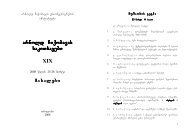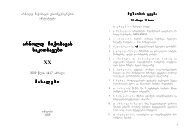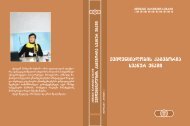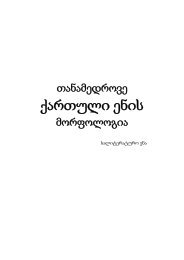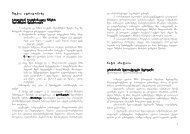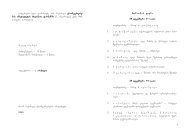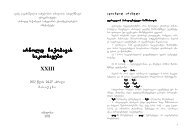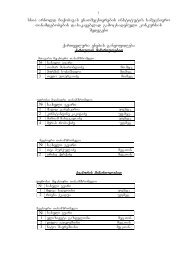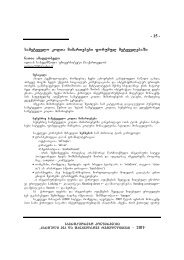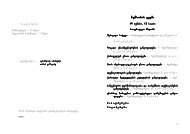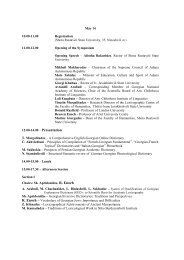5 r. a b a S i a (Tbilisi) bgeraTSesatyvisobis erTi rigisaTvis qarTvelur ...
5 r. a b a S i a (Tbilisi) bgeraTSesatyvisobis erTi rigisaTvis qarTvelur ...
5 r. a b a S i a (Tbilisi) bgeraTSesatyvisobis erTi rigisaTvis qarTvelur ...
You also want an ePaper? Increase the reach of your titles
YUMPU automatically turns print PDFs into web optimized ePapers that Google loves.
It is well-known, that in Upper Bal a radical -r -är causes the dissimilation<br />
of a plural consonant -är < -äl (T. Sharadzenidze).<br />
Analogous situation is in Lower Svan at every stem containing r: kor ‘a<br />
house’ – pl. kor-al (Lashkh.), kor-äl (Lent.)... Apart from these cases, manifestation<br />
of -äl suffix in Lentekhian is conditioned by the stem ending with l' – l’<br />
assimilates -r of –är suffix: Caful ‘a foot-wear’, Cafl-äl ‘foot-wears’ (Lent); i. e.<br />
dissimilation as well as assimilation of suffixial -är takes place in Lentekhian.<br />
The nouns with -a, -e vowel endings in Lashkhian manifest –ēl plural<br />
marker. In Lentekhian they lose the last vowel of a noun and add –ar/-al suffixes<br />
without umlaut. In some sub-dialects, in such kinds of nouns in Lentekhian the<br />
forms with umlauts are attested, e. g.: γäbena ‘a bullock’ – pl. γäben-ar/ -är;<br />
lare ‘a hay meadow’, pl. lar-al/-äl.<br />
The peculiarities of plural of the nouns ending with -i, -o, -u and –ai and<br />
the plural forms with double-suffix in the dialects of Lower Svan will be discussed<br />
in the paper; e. g. Zi… ‘necklace’ – Zi…-är, Zi…-ar<br />
ar-äl ‘necklaces’ (Lent.); lanxub<br />
‘brotherly’ – lanxub-ar-al ‘brotherlies’ (Lashkh.).<br />
I. G a l u t s k i k h (Zaporozhie)<br />
Historical Core Vocabulary Evolution After the Expansion of<br />
English World-Wide<br />
Core vocabulary is investigated within plenty of various paradigms. In<br />
this study English core vocabulary is treated as the corpus of lexemes that are<br />
marked by the highest degree of chronological stability in the course of<br />
language evolution, i.e. have been part of English since Old English period. Our<br />
previous research attested high functional, structural and evolutionary<br />
significance of core vocabulary in the lexicon [Skybina & Galutskikh, 2007].<br />
The results obtained stipulated further increase of attention to more detailed<br />
investigation of other aspects of this layer of the English lexicon.<br />
This research focuses on the study of core vocabulary evolution after the<br />
expansion of English world-wide. It is hypothesized that all changes in the<br />
lexicon that are its response to the altered extralinguistic reality and the work of<br />
adaptive mechanisms are projected into its historical core. Thus the direction<br />
and specificity of core vocabulary and entire lexicon evolution correlate both<br />
110



